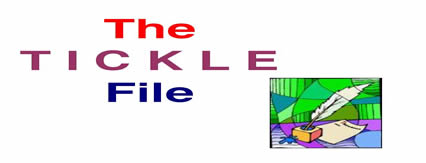
|
The Tickle File is ftm's daily column of media news, complimenting the feature articles on major media issues. Tickle File items point out media happenings, from the oh-so serious to the not-so serious, that should not escape notice...in a shorter, more informal format.
We are able to offer this new service thanks to the great response to our Media Sleuth project in which you, our readers, are contributing media information happening in your countries that have escaped the notice of the international media, or you are providing us information on covered events that others simply didn't know about. We invite more of you to become Media Sleuths. For more information click here. |
Hot topics click link for more
Nearly three-quarters of Hungarian voters received information about candidates and issues in the recent parliamentary election through traditional electronic media, radio and television. Online media informed 18% of voters. More than half (55%) said they accessed more sources, according to a report published by media regulator National Media and Communications Authority (NMHH), quoted by news portal 24.hu (May 18). Of those who reported accessing more sources, 91% went online and 49% to television. (See more about elections and media here)
Political advertising, an information subset, during the election was seen on TV by 69% of those surveyed. In a similar survey in 2006 93% of respondents reported seeing political ads on TV. During the recent election billboards - outdoor advertising - carried political ads seen by 59%, which the NMHH report “the most effective form of advertising.” In the capital Budapest, a separate survey subset, 41% of those surveyed recalled political ads, roughly half as many who recalled political ads in a similar 2006 survey (79%). The dominant Fidesz political party extensively used billboards during the campaign in rural areas, typically referring to immigration issues. (See more about media in Hungary here)
State TV channel M1 was the dominant television source of campaign information, reaching 32% of voters, lower in Budapest than elsewhere. Semi-religious commercial channel ATV reached 21% of voters. Correspondingly, online news portal index.hu reached 37% across the country, higher in cities. Facebook informed 18% of Hungarian voters.
What the public thinks of the news media resonates widely these days, certainly among the news media. “Mirror, mirror on the wall…” and all that. The degree to which news outlets shape attitudes or whether or not the public drives the news is a matter of great debate. A new study seems to show how reflecting the audience can be great for ratings, not so much for democracies.
The Pew Research Center, the think-tank of the Pew Memorial Trust that studies journalism and media, has done its fair share of significant news media studies. Most recently the Pew researchers set their sights on the relationships between the news media and political attitudes, not an uncommon academic inquiry. Also widely studied in recent years is the populist phenomenon upending the ageing right-left political analysis. The report on public attitudes toward news media and populist view points examined eight Western European countries - Denmark, France, Germany, Italy, the Netherlands, Spain, Sweden and the UK - and was released mid-May. (See the entire, very interesting report here)
“Those who hold populist views value and trust the news media less,” said the report, to the surprise of nobody. A populist point of view was identified for the study by affirmative responses to two questions; “Most elected officials don’t care what people like me think” and “Ordinary people would do a better job solving the country’s problems than elected officials.” Populism, in this and many other studies, pits “ordinary people” against perceived elites. Social scientists have flocked to TV talk shows to explain all of this.
Three issues, embraced by every political campaign consultant, draw out wide differences in the perceived value of the news media between those holding populist or non-populist views: economy, immigration and crime. There is, according to the study, a north-south divide on the public’s trust in and value toward the news media. Those surveyed in Germany, the Netherlands and Sweden trust the news media significantly more than those in Spain, France and Italy. The outlier is the UK, more similar to Southern Europe.
|


